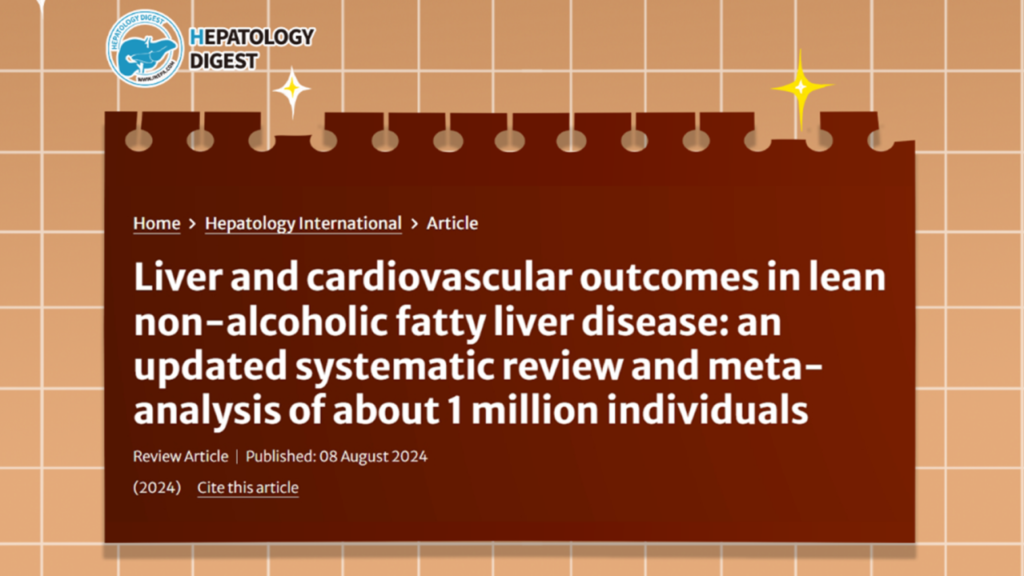
Editor's Note: While metabolic-associated fatty liver disease (MAFLD) has traditionally been associated with obesity and metabolic syndrome, recent studies indicate that a significant prevalence of MAFLD also exists among lean individuals. These patients typically do not exhibit traditional obesity-related risk factors, such as a high body mass index (BMI) or large waist circumference, yet their livers are affected by pathological changes similar to those seen in obese individuals. Recently, a research team led by Dr. Matheus Souza from the Federal University of Rio de Janeiro School of Medicine published a systematic review and meta-analysis that delves into the liver and cardiovascular risks in lean MAFLD patients compared to their non-lean counterparts. The findings offer new insights for clinical practice and public health strategies concerning MAFLD.Study Design
This study aimed to determine whether lean MAFLD patients have significantly different liver and cardiovascular outcomes compared to non-lean patients, and to explore whether these risks vary with the severity of MAFLD-related factors. To achieve this, the research team conducted a systematic literature search, identifying eligible cohort studies from PubMed and Embase databases. These studies evaluated liver and cardiovascular (CV) outcomes in MAFLD patients, including both lean and non-lean individuals, and reported either unadjusted or adjusted data.
Methodology
The research team utilized a random-effects model to pool relative risks (RRs) and hazard ratios (HRs), and conducted subgroup and meta-regression analyses to examine the impact of different factors on the outcomes. A total of 22 studies were selected, encompassing over 1 million MAFLD patients, 13.0% of whom were lean.
Results
The study found that in unadjusted analyses, lean MAFLD patients had a similar risk of liver-related events compared to non-lean patients (RR=1.08, 95%CI: 0.79-1.49). However, in adjusted analyses, lean patients exhibited a significantly higher risk (HR=1.66, 95%CI: 1.17-2.36). Notably, the risk of liver-related mortality was substantially higher in lean MAFLD patients than in non-lean patients (RR=2.22, 95%CI: 1.57-3.15; HR=2.26, 95%CI: 1.14-4.51).
For cardiovascular outcomes, unadjusted analyses showed a lower risk of cardiovascular disease in lean MAFLD patients (RR=0.82, 95%CI: 0.70-0.95), but in adjusted analyses, the risk was similar between the two groups (HR=0.89, 95%CI: 0.77-1.02). Additionally, the risk of cardiovascular mortality in lean MAFLD patients was comparable to that of non-lean patients (RR=1.09, 95%CI: 0.71-1.66; HR=1.26, 95%CI: 0.89-1.78).
Conclusion
The study results indicate that lean MAFLD patients have worse liver outcomes compared to non-lean MAFLD patients, while both groups have similar cardiovascular outcomes. This underscores the importance of closely monitoring both groups of patients.
Researcher’s Commentary
Professor Matheus Souza: “Our study is the first to comprehensively evaluate the liver and cardiovascular health risks in lean MAFLD patients, revealing that even within a seemingly healthy weight range, MAFLD can pose serious health threats. These findings have important clinical implications, highlighting the need for diligent monitoring and management of MAFLD regardless of the patient’s weight. Clinicians should consider various factors, including the severity of the disease and metabolic status, when assessing the prognosis of MAFLD patients to develop more precise treatment strategies.
Furthermore, this study serves as a reminder to the public and healthcare institutions that MAFLD is not exclusive to obese populations; lean individuals are also at high risk. Raising public awareness of MAFLD and strengthening early screening and intervention are crucial for reducing the burden of MAFLD and its complications.”


